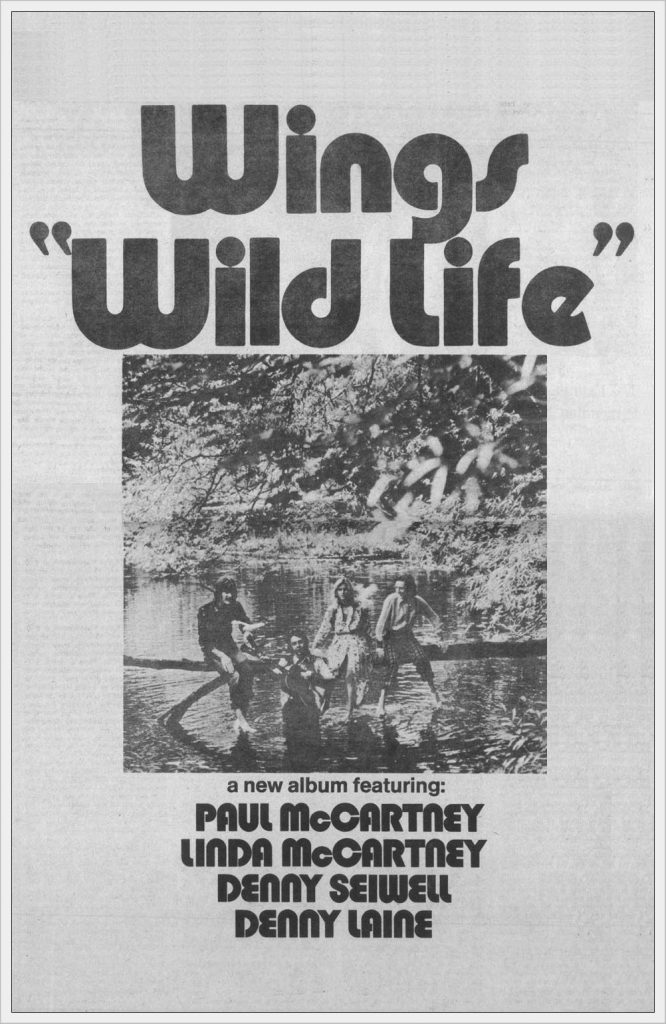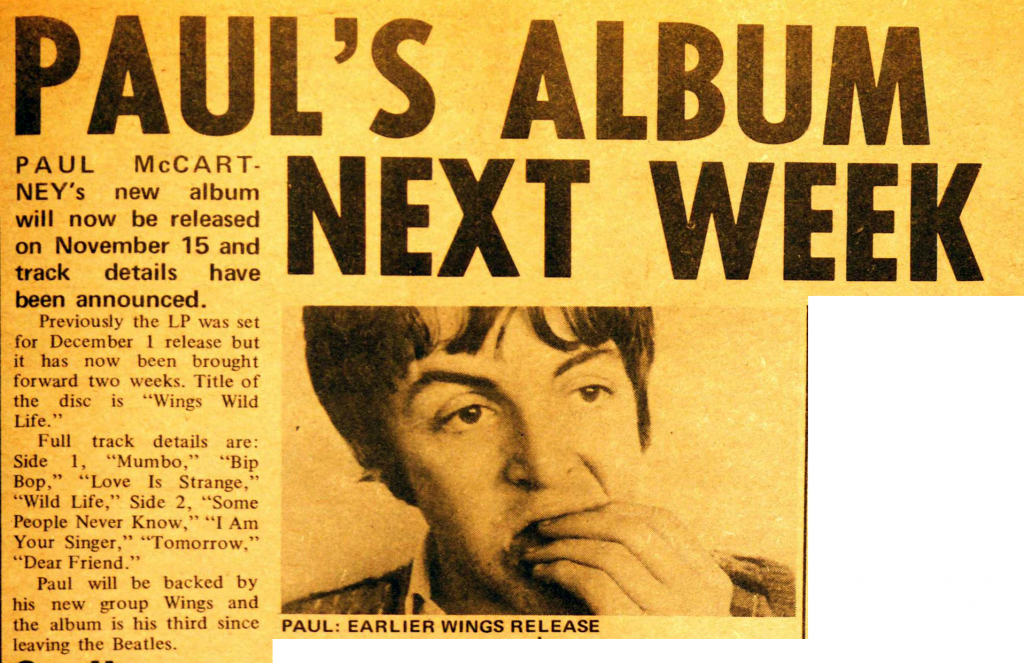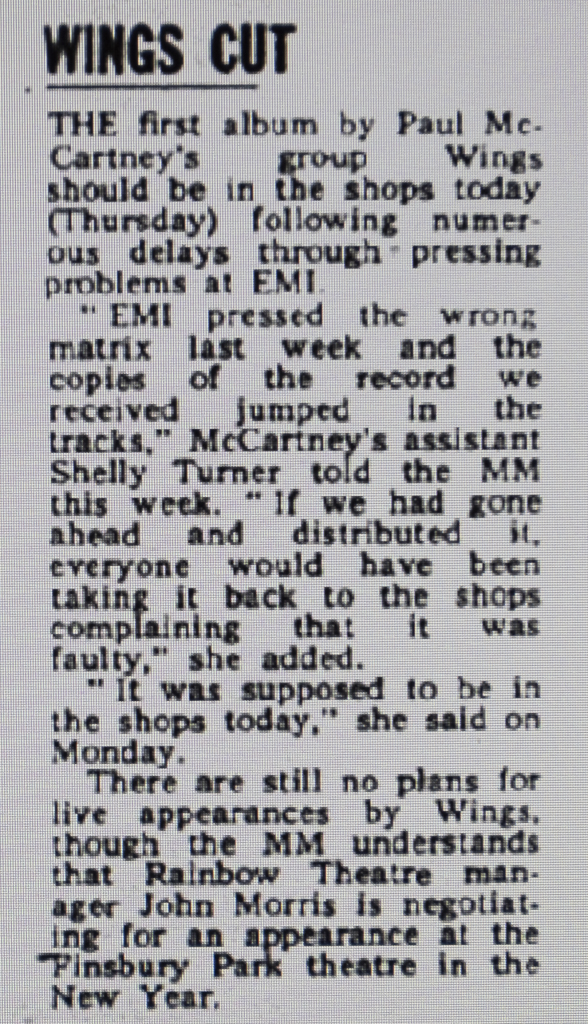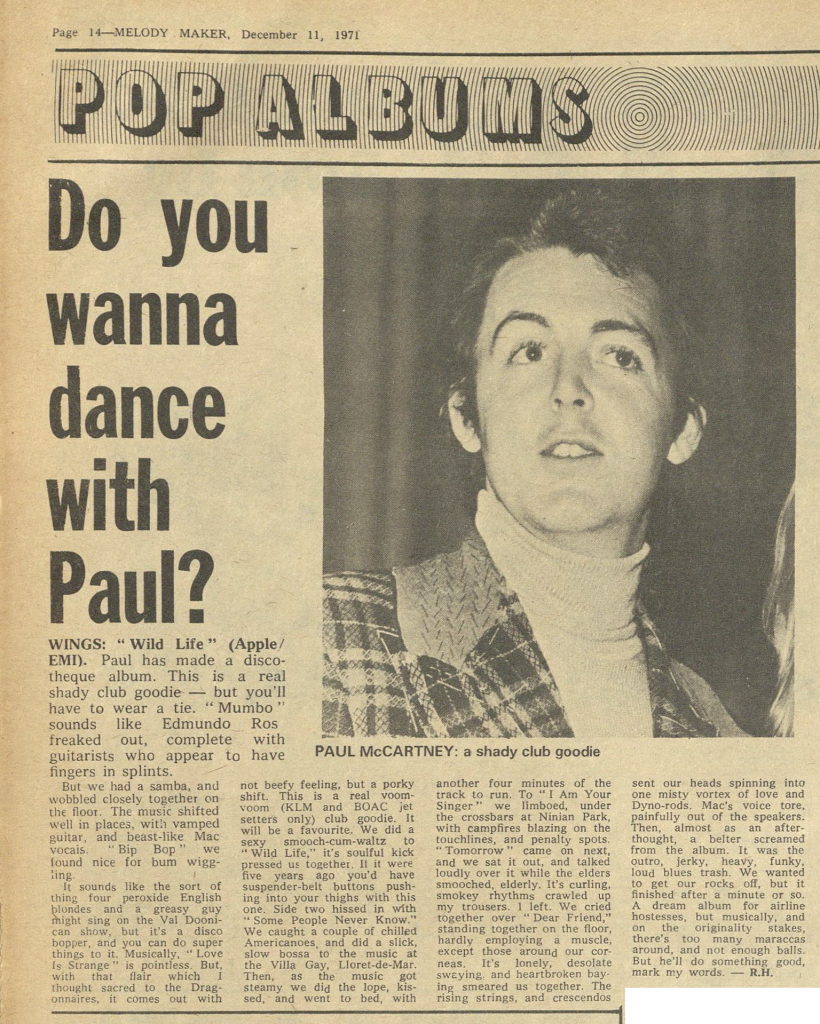UK Release date : Dec 07, 1971
Wild Life
By Wings • LP • Part of the collection “Paul McCartney • Studio albums”
Last updated on September 27, 2025
UK Release date : Dec 07, 1971
By Wings • LP • Part of the collection “Paul McCartney • Studio albums”
Last updated on September 27, 2025
Previous album May 21, 1971 • "Ram" by Paul & Linda McCartney released in the UK
Interview Late 1971 ? • Interview with Denny Laine
Interview Dec 04, 1971 • Wings interview for Record Mirror
Album Dec 07, 1971 • "Wild Life" by Wings released in the UK
Album Dec 07, 1971 • "Wild Life" by Wings released in the US
Interview Dec 09, 1971 • Paul McCartney interview for Aberdeen Press and Journal
This album was recorded during the following studio sessions:
Written by Paul McCartney, Linda Eastman / McCartney
3:58 • Studio version • A • Stereo
Paul McCartney : Bass, Electric guitar, Producer, Tambourine (?), Vocals Linda Eastman / McCartney : Organ, Piano Denny Laine : Electric guitar Denny Seiwell : Drums, Tambourine (?) Tony Clark : Mixing engineer, Recording engineer Alan Parsons : Mixing engineer assistant, Recording engineer assistant
SessionRecording : Jul 26, 1971 • Studio : EMI Studios, Abbey Road
SessionMixing : Oct 08, 1971 • Studio : EMI Studios, Abbey Road
Credits & recording details courtesy of Luca Perasi • From the books "Paul McCartney: Music Is Ideas. The Stories Behind the Songs" • Buy Volume 1 (1970-1989) and Volume 2 (1990-2012) on Amazon
Written by Paul McCartney, Linda Eastman / McCartney
4:10 • Studio version • A • Mono
Paul McCartney : Bass, Electric guitar, Producer, Vocals Linda Eastman / McCartney : Tambourine (?), Vocals Denny Laine : Electric guitar Denny Seiwell : Drums, Tambourine (?) Tony Clark : Mixing engineer, Recording engineer Alan Parsons : Mixing engineer assistant Chris Blair : Recording engineer assistant
SessionRecording : Jul 24, 1971 • Studio : EMI Studios, Abbey Road
SessionMixing : Oct 15, 1971 • Studio : EMI Studios, Abbey Road
Credits & recording details courtesy of Luca Perasi • From the books "Paul McCartney: Music Is Ideas. The Stories Behind the Songs" • Buy Volume 1 (1970-1989) and Volume 2 (1990-2012) on Amazon
Written by Ethel Smith, Mickey Baker, Sylvia Vanderpool
4:51 • Studio version • A • Stereo
Performed by : Paul McCartney • Linda Eastman / McCartney • Denny Laine • Denny Seiwell Paul McCartney : Producer Tony Clark : Mixing engineer, Recording engineer Alan Parsons : Mixing engineer assistant Chris Blair : Recording engineer assistant
SessionRecording : Jul 24, 1971 • Studio : EMI Studios, Abbey Road
SessionOverdubs : Oct 03, 1971 • Studio : EMI Studios, Abbey Road
SessionMixing : Oct 05, 1971 • Studio : EMI Studios, Abbey Road
Written by Paul McCartney, Linda Eastman / McCartney
6:42 • Studio version • A • Stereo
Paul McCartney : Acoustic guitar, Backing vocals, Bass, Electric guitar, Producer, Vocals Linda Eastman / McCartney : Backing vocals, Keyboards Denny Laine : Backing vocals, Electric guitar Denny Seiwell : Backing vocals, Drums Tony Clark : Mixing engineer, Recording engineer Alan Parsons : Mixing engineer assistant, Recording engineer assistant
SessionRecording : Jul 26, 1971 • Studio : EMI Studios, Abbey Road
SessionMixing : Oct 15, 1971 • Studio : EMI Studios, Abbey Road
Credits & recording details courtesy of Luca Perasi • From the books "Paul McCartney: Music Is Ideas. The Stories Behind the Songs" • Buy Volume 1 (1970-1989) and Volume 2 (1990-2012) on Amazon
Written by Paul McCartney, Linda Eastman / McCartney
6:37 • Studio version • A • Stereo
Paul McCartney : Acoustic guitar, Backing vocals, Bass, Bongos, Congas, Electric guitar, Guiro, Harmonium (?), Maracas, Piano, Producer, Vocals Linda Eastman / McCartney : Backing vocals, Harmonium (?), Keyboards, Vocals Denny Laine : Acoustic guitar, Backing vocals, Electric guitar Denny Seiwell : Bongos, Congas, Drums, Guiro Tony Clark : Mixing engineer, Recording engineer Alan Parsons : Mixing engineer assistant, Recording engineer assistant
SessionRecording : Jul 25, 1971 • Studio : EMI Studios, Abbey Road
SessionMixing : Oct 10, 1971 • Studio : EMI Studios, Abbey Road
Credits & recording details courtesy of Luca Perasi • From the books "Paul McCartney: Music Is Ideas. The Stories Behind the Songs" • Buy Volume 1 (1970-1989) and Volume 2 (1990-2012) on Amazon
Written by Paul McCartney, Linda Eastman / McCartney
2:19 • Studio version • A • Stereo
Paul McCartney : Bass (?), Electric piano, Producer, Recorder (?), Vocals Linda Eastman / McCartney : Harmonium (?), Organ (?), Vocals Denny Laine : Bass (?), Electric guitar Denny Seiwell : Drums, Maracas Tony Clark : Mixing engineer, Recording engineer Alan Parsons : Mixing engineer assistant Brian Blood : Recorder Peter Blood : Recorder Paul Blood : Recorder Jeanne Dolmetsch : Recorder Chris Blair : Recording engineer assistant Christine Blood : Recorder
SessionRecording : Jul 24, 1971 • Studio : EMI Studios, Abbey Road
SessionOverdubs : Jul 29, 1971 • Studio : EMI Studios, Abbey Road
SessionMixing : Aug 06, 1971 • Studio : EMI Studios, Abbey Road
Credits & recording details courtesy of Luca Perasi • From the books "Paul McCartney: Music Is Ideas. The Stories Behind the Songs" • Buy Volume 1 (1970-1989) and Volume 2 (1990-2012) on Amazon
Written by Paul McCartney, Linda Eastman / McCartney
0:52 • Studio version • A • Stereo
Paul McCartney : Acoustic guitar, Producer Tony Clark : Mixing engineer, Recording engineer Alan Parsons : Mixing engineer assistant, Recording engineer assistant
SessionRecording : Oct 02, 1971 • Studio : EMI Studios, Abbey Road
SessionMixing : Oct 17, 1971 • Studio : EMI Studios, Abbey Road
Written by Paul McCartney, Linda Eastman / McCartney
3:28 • Studio version • A • Stereo
Paul McCartney : Backing vocals, Bass (?), Electric guitar, Piano, Producer, Vocals Linda Eastman / McCartney : Backing vocals Denny Laine : Backing vocals, Bass (?), Electric guitar Denny Seiwell : Drums Tony Clark : Mixing engineer, Recording engineer Alan Parsons : Mixing engineer assistant, Recording engineer assistant
SessionRecording : Jul 26, 1971 • Studio : EMI Studios, Abbey Road
SessionMixing : Oct 08, 1971 • Studio : EMI Studios, Abbey Road
Credits & recording details courtesy of Luca Perasi • From the books "Paul McCartney: Music Is Ideas. The Stories Behind the Songs" • Buy Volume 1 (1970-1989) and Volume 2 (1990-2012) on Amazon
Written by Paul McCartney, Linda Eastman / McCartney
5:59 • Studio version • A • Stereo
Paul McCartney : Bass, Piano, Vibraphone (?), Vocals Denny Seiwell : Drums, Trumpet (?) Richard Hewson : Orchestration Tony Clark : Mixing engineer, Recording engineer Alan Parsons : Mixing engineer assistant Chris Blair : Recording engineer assistant Unknown : Four cellos, Four flutes, Harp, Oboe, Tenor saxophone, Two french horns, Two trombones
SessionRecording : Jul 24, 1971 • Studio : EMI Studios, Abbey Road
SessionMixing : Oct 05, 1971 • Studio : EMI Studios, Abbey Road
SessionOrchestra overdubs : Oct 16, 1971 • Studio : EMI Studios, Abbey Road
SessionMixing : Oct 16, 1971 • Studio : EMI Studios, Abbey Road
Credits & recording details courtesy of Luca Perasi • From the books "Paul McCartney: Music Is Ideas. The Stories Behind the Songs" • Buy Volume 1 (1970-1989) and Volume 2 (1990-2012) on Amazon
Written by Paul McCartney, Linda Eastman / McCartney
0:53 • Studio version • A • Stereo
Paul McCartney : Bass (?), Producer Denny Laine : Electric guitar (?) Denny Seiwell : Drums (?) Tony Clark : Mixing engineer, Recording engineer Alan Parsons : Mixing engineer assistant, Recording engineer assistant
SessionRecording : Oct 08, 1971 • Studio : EMI Studios, Abbey Road
SessionMixing : Oct 08, 1971 • Studio : EMI Studios, Abbey Road
From the liner notes:
When Paul and Linda McCartney were in New York recording ‘RAM’ they needed a drummer so they found a sweaty old basement in the West 40’s and invited some drummers to play on a battered old drum kit. One of those who turned up and went straight for his tom toms was Denny Seiwell, a tall type with eight generations of drummers in his family, who played well and left the drum kit throbbing. After that, Paul, Linda and Denny played together on ‘RAM’ and then each took off for a holiday.
The Macs returned to Britain and during the time following wrote a bunch of songs at their country retreat.
When the time came to go recording again they rang Denny Laine, a Birmingham lad, and asked him if he was coming out to play. Replying in the affirmative he brought his faithful guitar, and he and the Macs, along with Denny S. (who had arrived from the States as if by magic carrying his wife who was drunk again) and his drums, proceeded.
They rehearsed for a while, sang some old songs, wrote some new ones and in time headed for the big city studios.
In three days they had laid down most of the tracks and by the end of a couple of weeks the album was finished.
In this wrapper is the music they made. Can you dig it?
Clint Harrigan (pseudonym of Paul McCartney)
From Wikipedia:
Wild Life is the debut studio album by the British–American rock band Wings and the third studio album by Paul McCartney after the breakup of the Beatles. The album was recorded in eight days, from 25 July to 2 August 1971, at Abbey Road Studios by McCartney, his wife Linda, session drummer Denny Seiwell, whom they had worked with on the McCartney’s previous album Ram, and guitarist Denny Laine, formerly of the English rock band the Moody Blues. It was released by Apple Records on 7 December in the UK and US, to lukewarm critical and commercial reaction.
Recording
In July 1971, with a fresh set of McCartney tunes, the newly formed Wings recorded the album in slightly more than a week with the mindset that it had to be instant and raw in order to capture the freshness and vitality of a live studio recording. Five of the eight songs were recorded in one take. Paul McCartney later cited the quick recording schedule of Bob Dylan as an inspiration for this. The first session was held at Abbey Road Studios on 25 July. Footage of McCartney playing “Bip Bop” and “Hey Diddle” from around this time was later included in the made-for-TV film Wings Over the World.
The album was rehearsed at McCartney’s recording studio in Scotland dubbed Rude Studio, which Paul and Linda had used to make demos of songs that would be used in the album, and recorded at Abbey Road with Tony Clark and Alan Parsons engineering. Paul had lead vocal parts on all tracks, sharing those duties with Linda on “I Am Your Singer” and “Some People Never Know”. “Tomorrow” features background vocals from Denny Laine and Linda McCartney.
After the rehearsals at Rude, the recording moved to Abbey Road Studios, where the album was completed in a few weeks. According to drummer Denny Seiwell, five of the eight recorded tracks were done in one take. One almost definite example of this is “Mumbo”, the opener on the album. According to Clark, they were just jamming and Clark decided to start recording. McCartney, upon noticing, shouted “Take it, Tony” and started ad-libbing lyrics.
On the promotional album The Complete Audio Guide to the Alan Parsons Project, Parsons discusses how he did a rough mix of “I Am Your Singer” that Paul liked so much, he used it for the final mix on the album.
Music and lyrics
“Dear Friend”, recorded during the Ram sessions, was apparently an attempt at reconciliation with John Lennon. It followed Lennon’s attack on McCartney in the song “How Do You Sleep?”, from the album Imagine, which had been in retaliation for McCartney’s perceived digs at Lennon in “Too Many People” on Ram. Music critic Ian MacDonald cited “Dear Friend” as a counter-argument to the caricature of McCartney as an emotional lightweight.
Wild Life also included a reggae remake of Mickey & Sylvia’s 1957 top 40 hit “Love Is Strange“. A promotional single was distributed in the UK by Apple in December 1971 with catalogue No. R5932, but the commercial release was cancelled due to poor album sales.
Release and reception
After announcing to the media the band’s formation on 2 August 1971, the group were named “Wings” on 9 October. On 8 November, the group held a press party in London to announce both the group and Wild Life, which was released on 7 December, in both the UK and US, to lukewarm critical and commercial reaction. The album reached number 11 in the UK and number 10 in the US, where it went gold. At the same press party, in an interview with Melody Maker, McCartney said that the group should soon be performing live. John Mendelsohn wrote in Rolling Stone that he wondered whether the album may have been “deliberately second-rate.” In The Beatles: An Illustrated Record, Roy Carr and Tony Tyler called the album “rushed, defensive, badly timed, and over-publicized” and wrote that it showed McCartney’s songwriting “at an absolute nadir just when he needed a little respect”. The liner notes for Wild Life (and on the Thrillington album) were credited to Clint Harrigan, but in 1990 McCartney admitted to journalist Peter Palmiere that he was Harrigan.[citation needed] Lennon claimed to know the identity of Harrigan during their Melody Maker feud in 1972.[citation needed]
In December 1971, a Ram outtake “Breakfast Blues” was mixed by Paul and Linda at A&R Studios. “Breakfast Blues” was played on WCBS-FM, where McCartney promoted Wings and Wild Life, on 15 December. The track was later released as “Great Cock and Seagull Race” on the 2012 special edition of Ram.
The album was first released on CD by EMI’s budget Fame label, on 5 October 1987. In addition to naming the previously hidden tracks (“Bip Bop Link” and “Mumbo Link”), this edition added “Oh Woman, Oh Why” (the B-side of “Another Day“), “Mary Had a Little Lamb” and “Little Woman Love” as bonus tracks. In 1993, Wild Life was remastered and reissued on CD as part of ‘The Paul McCartney Collection’ series with singles “Give Ireland Back to the Irish” and “Mary Had a Little Lamb” as well as B-sides “Little Woman Love” and “Mama’s Little Girl” — all recorded in 1972 except for “Little Woman Love”, which was a Ram outtake – as bonus tracks, and also two hidden tracks: “Bip Bop Link” (an acoustic guitar piece) between “I Am Your Singer” and “Tomorrow”; and “Mumbo Link” (an instrumental jam) after “Dear Friend”. (“Oh Woman, Oh Why” appeared separately as a bonus track on the 1993 reissue of Ram.) A version recorded in the garden of Paul’s Scotland home circa June 1971 of the bluegrass-styled “Bip Bop” featured Paul and Linda’s daughter Mary giggling in the background, and segued into a riff called “Hey Diddle”. This surfaced in 2001 on the compilation Wingspan: Hits and History.
In 2007, Paul McCartney’s catalogue was released on iTunes. Wild Life received an instrumental version of “Give Ireland Back to the Irish” (originally released as b-side of the single) as a bonus track.
In 2018, Wild Life was reissued as part of the Paul McCartney Archive Collection. The bonus tracks included the single “Give Ireland Back to the Irish” and its instrumental b-side, promo single edit of “Love Is Strange” and a number of home demos and studio outtakes, including unedited home performances of “Bip Bop” and “Hey Diddle”, previously released on Wingspan: Hits and History. […]
Since we were kids, this had been the whole dream. Now here was John announcing the dream was over. So, okay, what do you do when you wake up?
Paul McCartney, September 2017
We recorded that album very quickly, it was almost like a bootleg, which may be a shame and perhaps some of the songs aren’t as good as they might be. I wanted the whole album to be loose and free, so that everyone could get into it. Things like Mumbo, which scream a bit and have only ‘mumbo’ as lyrics may offend a few old ladies, but generally it’s got something for everyone.
Paul McCartney
I wanted to make an album just like that! [Clicks his fingers.] And Bob Dylan had just done an album in a few days, kind of thing. So I thought, ‘Yeah,’ you know. ‘That’d be good. Give it a freshness.’ That was the approach for putting Wild Life together.
Paul McCartney – From paulmccartney.com, October 29, 2018
Dylan inspired Wild Life, because we heard he had been in the studio and done an album in just a week. So we thought of doing it like that, putting down the spontaneous stuff and not being too careful. So it came out a bit like that. We wrote the tracks in the summer, Linda and I, we wrote them in Scotland in the summer while the lambs we gambolling. We spent two weeks on the Wild Life album all together. At that time, it was just when I had rung Denny Laine up a few days before and he came up to where we were to rehearse for one or two days.
Paul McCartney
People like it a lot more now because of its rawness. The point was we were just trying out the band on that album. It was just a case of let’s just rehearse a few songs and go in the studio. Let’s not get too big time about it. I like that album.
The reason the critics knocked it (‘Wild Life’) was because they were expecting a big production. But you know, you have to understand that when a band is just starting you’re not in the mood to go in and do that. We were not trying to follow The Beatles or The Moody Blues, we were just trying to do our own thing. The fact that we went out and started turning up at universities just to play meant that we needed to play live to an audience to get into the feel of the band. Get into the confidence and the rest of it. So that album really was a result of that band where we were at that time. You know it was a take-it-or-leave-it type of attitude.
Denny Laine, Interview with Tallahassee Democrat, 2017
Paul asked for me to be present on the sessions for the album and the feeling had been very relaxed, marvellous and very enjoyable. The whole essence of the feeling was that whatever was going on, we had to get it as live as we possibly could in the studio. The whole idea was to get a live feel. The album was done over two weeks with most of the songs being done on first or second takes.
Tony Clark, Recording engineer








If we modestly consider the Paul McCartney Project to be the premier online resource for all things Paul McCartney, it is undeniable that The Beatles Bible stands as the definitive online site dedicated to the Beatles. While there is some overlap in content between the two sites, they differ significantly in their approach.

Notice any inaccuracies on this page? Have additional insights or ideas for new content? Or just want to share your thoughts? We value your feedback! Please use the form below to get in touch with us.
The Paul McCartney Albums That Rock Critics Really Destroyed – Primetweets • Apr 19, 2019 • 6 years ago
[…] Beatles: An Illustrated Record, the pair of critics who authored the book described Wild Life as “an absolute nadir” for Paul’s songwriting […]
Wings Wild Life – Cosmically Conscious • May 06, 2021 • 4 years ago
[…] Sources:– https://www.the-paulmccartney-project.com/album/wild-life/ […]
Tony Littman • Dec 03, 2022 • 3 years ago
Who was the R.H. who wrote that dreadful review in the MM? What on earth was he on when he wrote that?